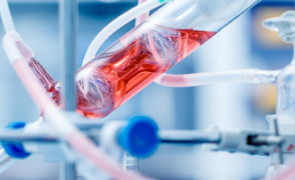Building a Sustainable BioPharma Industry

BioVoiceNews | January 2023
Building a Sustainable BioPharma Industry
At the cusp of a transformation, biopharma industry needs to adopt a sustainability mindset in every aspect of drug development
The pharmaceuticals industry, in general, has been lagging significantly on sustainability measures. It is quite ironical that the industry that is considered to be a saviour of human lives actually leaves a trail of huge carbon footprint. However, besides environmental impact, sustainability also refers to the concept of mitigating risks in order to optimize costs, output and profitability. Pharma manufacturers as well as biopharma companies can unleash a host of benefits by employing both these aspects of sustainability in their manufacturing processes.
Minimizing manufacturing waste is one of the crucial ways how production efficiencies can be optimized while lowering the overall environmental impact of the manufacturing process. It would be pertinent to note that the pharmaceuticals industry is one of the least efficient of all chemical industries when it comes to waste management. Besides, energy usage, which accounts for around 70-80% of the manufacturing costs, is another factor that adds to the overall expenses while adding up to environmental impact.
In this direction, many pharma companies are looking at reusing spent organic solvents through solvent incineration, which helps recover stored energy. Similarly, many biopharma companies are switching to single- use systems instead of traditional stainless steel equipment as these offer many benefits – require significantly lesser time, energy, labor and capital for setup. Moreover, they are very handy when it comes to retooling or making swift product line changes, and entail less- cumbersome sanitation processes. Single–use components are effectively helping biopharma companies optimize costs and productivity through reduced energy and water consumption.
Technology - the Key Enabler
Undoubtedly technology is the key to achieve sustainable growth in any industry. Digital transformation is crucial to deliver enhanced patient care, supervision, reduced costs and improved drug discovery and development. The overall quality, affordability and accessibility of live-saving drugs is also dependent on these digital tools. Social sustainability is another crucial aspect that pharma players need to focus on, given the fact that access to drugs, medical care and vaccines, till today, is not easily available to every individual in India. The focus, thus, should be on delivering to affordable drugs and life-saving treatments to the lowest rung of the society. The need of the hour is to develop a patient-centric business model that delivers high-quality, cost-effective,efficient drugs of highest ethical and regulatory standards through sustainable practices. And technology can help pharma players reach there.
Automation Drive
Although relatively slow in adapting technological advancement, biopharma players are seeking ways to adopt advanced technologies such as robotics, data analytics, different workflows, etc into their processes, as these tools have a great potential to drive innovation and remove inefficiencies and open new avenues to achieve sustainability goals. Automation is helping biopharma players cut down administrative expenses and are exploring opportunities to create more value through intelligent systems to improve work processes be it robotic process automation for operational maintenance, smart workflows for improved patient and physician relationship, AI/ML for drug discovery and to predict success rate of molecules. Data analytics is also helping pharma companies create more nuanced approaches and customised workflows,improving relationships with their channel partners. In other areas, new age technology such as AR/VR, AI/ML, 3D printing and additive manufacturing has the potential to refurbish the entire research and development process. Pharma companies are harnessing these tools to conduct tests in shorter timelines, improve efficiencies and compliance across the manufacturing process.
Automation and advanced analytics are helping pharma companies develop enhanced employment strategies, build capabilities and develop critical skills among employees. To make digital transformation truly productive and meaningful, pharma companies need to develop planned and sustainable transformation of their workforce. Instead of simply jumping on the bandwagon, pharma players need to assess their work-processes and determine how automation can create more value within their organization to drive productivity and innovation. For instance, data analytics can help in clinical trials for selecting optimal patient cohorts, or to identify compounds with highest chances of success.
Greener Pastures
As the push towards sustainability gains momentum, pharma players are moving towards greener avenues for manufacturing biopharmaceuticals. Companies have been traditionally using mammalian cell cultures oranimal-based cultures to produce large complex proteins for therapeutic drugs. This is,however, changing. Given the widespread demand for bio-pharmaceuticals across the globe, there is considerable pressure on animal-based resources for production of biopharma products. Moreover, the scope for expansion also remains limited on account of high costs involved and limitation to scale. This has driven pharma manufacturers towards greener options, replacing animal-based cell cultures with plants.
Resilient Supply Chains
Resilient and reliable supply chains are one of the cornerstones of sustainable development. However, pharma companies continue to struggle with supply chain disruptions. Supply of most active pharma ingredients are unpredictable, expensive, inefficient and thwart manufacturing processes, causing inordinate delays in production timelines. In this regard, many pharma players are switching to more sustainable options such as outsourcing of bioprocessing to other countries, where it is more viable and cost- effective. Developing countries such as India, Vietnam and Bangladesh are emerging as popular destinations for contract manufacturing on account of their low costs of manufacturing, availability of inexpensive labour and raw materials, and efficient research and development abilities. Pharma players that lack the resources to build manufacturing units in their own backyard are finding it lucrative to outsource part of their manufacturing activities to contract manufacturers. Even large pharma companies are moving into these countries as a strategic move to reduce costs and achieve other gains. As biopharma manufacturing is a highly- complex process entailing specialized equipment and skills, it is a win–win game for both the manufacturers as well as the ultimate consumer.
This also takes care of the supply chain woes. A country like India, which has a rich source of raw materials, technical expertise and WHO- approved production sites, is gaining popularity as an alternative to China. Amid geo–political tensions, the world has been looking to diversify away from the traditional source of supply, China, to ensure supply-chain security. Looking at this proposition, the government has also supported the industry through positive policy interventions – it has fast–tracked many initiatives to bolster the domestic pharma industry; allowed FDI upto 100% under the automatic route for manufacture of medical devices.
Environment-friendly R&D
Sustainable practices should be a part of every aspect of their research and development process, right from product discovery to its launch, its commercial lifetime and further to its end–of-use and disposal. Beginning with the research labs, how they are operated, products discovered, developed and produced. Using green resources, companies are developing potential new drugs with the least environmental impact and that too, without compromising on the drug efficacy or safety. Moreover, reduced wastage, better use of electricity, chemicals and water, and single–use plastics is helping pharma companies run and operate R&D sites with enhanced operational efficiency and at optimal costs and energy/water usage. All in all, the biopharma industry is at the cusp of a transformation, which demands a behavioural change necessitating a sustainability mindset in every aspect of the drug development. Through small yet effective changes towards sustainable goals, the industry can better manage energy, water, waste and chemicals across the production process and thus reduce the overall environmental impact.
In 2006, Gaurav Kaushik, a young and dynamic first generation entrepreneur, set out to author a legacy. Today, under his leadership Meteoric Biopharmaceuticals, with over 100 products is a leading name in the biopharma landscape across the globe. A gold medallist in Biotechnology and an astute businessman, Gaurav has been awarded the Rashtriya Udyog Ratan Award by Council of Economic Growth & Research, in 2010. He is also the recipient of the Indian Leadership Award for Industrial Development by All India Achievers Foundation, 2011.
About Us

- We are research driven
- We are one stop solution for all biologics
- We are Custom Formulation and Product Customisation under a single roof
- We have a deep understanding of developed market regulations and procedures
- We offer Expanding production capabilities
Services
- Product Custamization
- Concept Formulation
- Contract Manufacturing
- Research and Development
- Innovations
